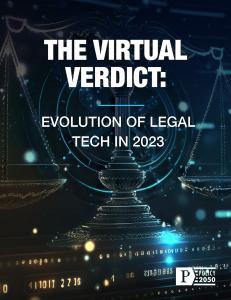The Evolution of Legal Tech: Implications and Innovations
A Policy2050.com analysis encapsulates lawyers’ perspectives on digital documents, Legal Tech software, Big Tech’s influence, and the promises and perils of AI.
SAN FRANCISCO, CALIFORNIA, USA, September 10, 2023/EINPresswire.com/ -- Tech-focused research and strategy firm Policy2050.com has released a new whitepaper titled “The Virtual Verdict: Evolution of Legal Tech in 2023” in its open-access Quick Insights category.
A vast global population remains underserved in terms of civil legal needs. Legal Tech could bridge this gap, making law firms more efficient and legal services more accessible. But might AI be something of a Pandora’s box, especially given the complexities of justice?
Policy2050.com interviewed legal experts from across the United States to gauge their views on recent Legal Tech developments. This endeavor reflected the recently launched Policy2050.com Social Innovations/ESG Membership, which imagines a world where progress is measured not only by profits generated, but by lives improved, ecosystems protected, and injustices rectified.
The analysis details how Legal Tech, once seen as stagnant, accelerated during the pandemic. The release documents the impact of Legal Tech in a post-pandemic world, exploring the integration of AI, digital documentation, Big Tech, and workforce transitions.
“Lawyers are concerned about a Legal Tech market that innovates and diversifies only to later consolidate,” commented Policy2050 founder David Pring-Mill.
Legal experts interviewed for this report included Emanuel Galimidi, Personal Injury and Wrongful Death Attorney, Galimidi Law; Bernard Williams, Founder, Company Counsel Law; Cheyenne Hunt, Big Tech Accountability Advocate and Congressional Candidate; Barry P. Goldberg, Trial Attorney; Derek Jacques, Attorney and Principal Owner, The Mitten Law Firm; Shavon Jones, Practicing Administrative Lawyer and Chief Content Officer, Sales for Lawyers.
During the pandemic, the significant increase in venture capital investments ($1B in 2021 vs. $82M in 2017) and the growing adoption of cloud-based document and practice management solutions signaled a shift. While this digital transformation streamlined many processes, the threat of monopolistic control looms over recently adopted digital resources. The possible exclusion of non-tech-savvy legal professionals, whose experiences remain invaluable, undermines some of the newly gained efficiencies. AI might even lead to technological unemployment. The subject-matter experts shared their diverse views on these issues.
Barry P. Goldberg underscored the significance of digital documentation, explaining how immediate evidence capture has become the recommended first step in auto accident cases. He said, “We immediately request our clients to use their smartphones to capture photographs and videos of the accident scene, vehicle damage, and any visible injuries. These visual records provide us with invaluable real-time evidence that paints a vivid picture of the accident’s aftermath.”
Emanuel Galimidi predicted cascading changes or even technological unemployment, anticipating that “the first job to go away in the legal profession is that of the court reporter. It’s such low-hanging fruit.”
Elaborating on the vulnerabilities of first-year lawyers, Galimidi suggested that AI will perform their typical entry-level tasks “at a fraction of a fraction of the cost, never ask for a raise, or mentorship or time off, et cetera.”
He said, “I’ve told young lawyers, ‘You guys need to learn how to prompt because I’m learning. And I’m a 20-year lawyer, and I’m beginning to learn how to prompt, because I know it’s important just for my own practice.’ And in a couple of years, I’m not going to need to hire a first-year lawyer to do research and prepare basic forms and notices and basic motions, or maybe even a bit more complex ones.” It would likely make more sense, at that time, to automate these processes, review documents, and modify as needed.
Galimidi also observed that while larger law firms initially held back or at least did their tinkering quietly, they seemed to take a closer look at AI when enterprise clients — now enjoying the efficiencies AI brought into their own businesses — upped their demands for quicker, more cost-effective results in uncertain economic times. Large law firms, feeling the pressure, began forming “global task forces on AI” to ensure they weren’t left in the dust by more agile competitors.
When it comes to Legal Tech applications potentially getting gobbled up by large tech corporations, Derek Jacques voices concerns, mainly centered around data privacy. Jacques opined, “The vast majority of Big Tech companies have shown a less than firm commitment to protecting the privacy of users.”
Cheyenne Hunt, J.D., a big tech accountability advocate at Public Citizen and Congressional candidate in California’s 45th district, warned that potential acquisitions of specialized legal software providers by large tech corporations would present several drawbacks. She explained, “It becomes a smaller sub-department rather than a specialized service of accessible industry professionals. Most importantly, it combines the services under a single umbrella, which creates a substantial risk of monopolization. As software acquisition becomes more common, tech companies bundle less functional services to reduce management overhead and raise prices.”
Shavon Jones pointed to the potential of emerging technology segments, suggesting that “Legal Tech coupled with sales technologies and narrow AI can immediately impact and ultimately help solve the Access to Justice (A2J) crisis by helping consumer attorneys and community legal firms build volume practices. Volume practices drive down the cost of legal services and would allow the legal profession to meet more demand downmarket.”
Bernard Williams, attorney and founder of Company Counsel Law, reminisced about the early days of his legal practice. “When I first began practicing law 20+ years ago, my office was filled with binders, Redweld folders, and stacks of Bankers Boxes stuffed with paper,” he recalled. The transition to digital documentation now means that every document from every case essentially travels with him, accessible with just a few taps on his phone. Yet, Williams candidly admits a nostalgic fondness for the tangible nature of paper files. “If I’m really being honest, I do miss the tactile feel of working with paper files – there’s something about reading a document that you’re holding in your hand that makes the content more engaging and memorable for me,” he shared.
ABOUT POLICY2050.COM
Through market research and memberships, Policy2050.com seeks to influence the future of tech policy and business strategy in order to bring about a sustainable, fair, and vibrant economy.
David Pring-Mill
Policy2050.com
david.pringmill@policy2050.com
Visit us on social media:
Twitter
LinkedIn
Legal Disclaimer:
EIN Presswire provides this news content "as is" without warranty of any kind. We do not accept any responsibility or liability for the accuracy, content, images, videos, licenses, completeness, legality, or reliability of the information contained in this article. If you have any complaints or copyright issues related to this article, kindly contact the author above.



